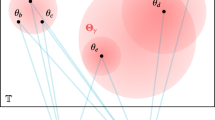Abstract
Despite Vancil’s (1979) proclamation over twenty years ago that topoi have been abandoned in argument theory, this essay contends that topoi should have a vital role in contemporary argumentation theory. Four key areas are identified where topoi are (or can be) essential tools for argumentation: Locating argument, building argument, development of critical thinking, and argument pedagogy. As a result, teachers and students of argument can both benefit from a (re)discovery of topoi.
Similar content being viewed by others
References
Arthos J. (2000). Locating the Instability of the Topic Places: Rhetoric, Phronesis and Neurobiology. Communication Quarterly 48: 272–292
Bilsky M., McCrea H., Streeter R. E. and Weaver R. M. (1953). Looking for an Argument. College English 14: 210–216
Braet A. C. (2004). The Oldest Typology of Argumentation Schemes. Argumentation 18: 127–148
Bruxelles S., Ducrot O. and Raccah P. (1995). Argumentation and the Lexical Topical Fields. Journal of Pragmatics 24: 99–114
Cicero M. T. (1942). De Partitone Oratoria. Loeb, New York
Cicero M. T. (1962). De Inventione. Loeb, New York
Covino W. A. and Joliffe D. A. (1995). Rhetoric. Allyn & Bacon, Boston
Elder L. and Paul R. (1994). Critical Thinking: Why we Must Transform our Teaching. Journal of Developmental Education 18: 34–35
De Pater W. A. (1968). La fonction du lieu et de l’instrument dans les Topiques. In: Owen, G. E. L. (eds) Aristotle on Dialectic: The Topics, pp 164–188. Oxford University Press, Oxford
Eemeren F. H., Grootendorst van, R. and Henkemans F. S. (1996). Fundamentals of Argumentation Theory: A Handbook of Historical Backgrounds and Contemporary Developments. Lawrence Erlbaum, Mahwah, NJ
Ennis R. H. (1989). Critical Thinking and Subject Specificity. Educational Researcher 18: 4–10
Fahenstock J. and Secor M. (1991). The Rhetoric of Literary Criticism. In: Charles, Bazerman and James, Paradis (eds) Textual Dynamics of the Professions: Historical and Contemporary Studies of Writing in Professional Communities, pp 76–96. University of Wisconsin Press, Madison, WI
Feteris E. T. (2001). Argumentation in the Field of Law. In: (eds) Crucial Concepts in Argumentation Theory, pp 201–225. Amsterdam University Press, Amsterdam
Fowler, B.: 1996, ‘Critical thinking definitions’, [on-line]. Available: http://www.kcmetro.cc.mo.us/longview/ctac/definitions.htm
Garssen B. (2001). Argument Schemes. In: (eds) Crucial Concepts in Argumentation Theory, pp 81–99. Amsterdam University Press, Amsterdam
Green-Pedersen, N. J.: 1984, The Tradition of the Topics in the Middle Ages: The Commentaries on Aristotle’s and Boethius’ Topics, Philosophia Verlag, München
Haynes, C.: 1996, ‘Inside the Teaching Machine: Actual Feminism and (Virtual) Pedagogy. Computers, Writing, Rhetoric and Literature, 2’, [on-line]. Available: http://www.cwrl.utexas.edu/currents/cwrl/v2n1/haynes/
Hill B. and Leeman R. W. (1997). The Art and Practice of Argumentation and Debate. Mayfield, Mountain View, CA
Inch E. S. and Warnick B. (2002). Critical Thinking and Communication: The Use of Reason in Argument. Allyn & Bacon, Boston
Infante D. A. (1971). The Influence of a Topical System on the Discovery of Argument. Speech Monographs 38: 125–28
Jost W. (1991). ‘Teaching the Topics: Character, Rhetoric and Liberal Education’. Rhetoric Society Quarterly 21: 1–16
Kienpointner M. (1997). On the Art of Finding Arguments: What Ancient and Modern Masters of Invention Have to Tell us About the `Ars Inveniendi'. Argumentation 11: 225–236
Kirch A. (1996). A Basic Writer’s Topoi for Timed Essay Tests. Journal of Basic Writing 15: 112–124
Kemp, J. D.: 1995, Dec. 1, Topoi, [on-line]. Available: http://www.Irc.gatech.edu/gallery/rhetoric/noframes/terms/topoi.html
Kennedy G. A. (1996). Reworking Aristotle’s Rhetoric. In: Johnstone, C. L. (eds) Theory, Text, Context: Issues in Greek Rhetoric and Orator, pp 169–188. State University of New York Press, Albany
Leff M. (1983). The Topics of Argumentative Invention in Latin Rhetorical Theory from Cicero to Boethius. Rhetorica 1: 23–45
McAdon B. (2003). Probabilities, Signs, Necessary Signs, Idia and Topoi: The Confusing Discussion of Materials for Enthymemes in the Rhetoric. Philosophy and Rhetoric 36: 223–248
Miller C. (1987). Aristotle’s ‘special Topics’ in Rhetorical Practice and Pedagogy. Rhetoric Society Quarterly 17: 61–70
Ochs, D. J.: 1966, The Tradition of the Classical Doctrines of Rhetorical Topoi, Ph.D. Dissertation, University of Iowa
Ochs D. J. (1969). Aristotle’s Concept of Formal Topics. Speech Monographs 36: 419–425
Perelman C. (1982). The Realm of Rhetoric. University of Notre Dame Press, Notre Dame, IN
Perelman C. and Olbrechts-Tyteca L. (1969). The New Rhetoric: A Treatise on Argumentation. University of Notre Dame Press, Notre Dame, IN
Pullman George L (1994). Rhetoric and Hermeneutics: Composition, Invention and Literature. JAC 14: 367–387
Quintilian, M. B.: 1920, The Institutes of Oratory (H. E. Butler, Trans.), Harvard University Press, Cambridge
Raccah P. Y. (1990). Modelling Argumentation and Modeling with Argumentation. Argumentation 4: 447–483
Rieke R. D. and Sillars M. O. (1993). Argumentation: Critical Decision Making. Harper Collins, New York
Rolfe M. (1932). Cicero and His Influence. Longmans, Green, & Co, New York
Siegel H. (1988). Educating Reason: Rationality, Critical Thinking and Education. Routledge, New York
Smith R. (1989). Aristotle: Prior Analytics. Hackett, Indianapolis
Solmsen F. (1929). Die entwicklung der Aristotelischen Logic und Rhetorik. Neue Philogische Untersuchungen IV: 151–164
Sovacool, B.: 2003, The Use of Topoi in Academic Debate, Wayne State University Publishing (Master’s Thesis), Detroit, MI
Tallmon, J. M.: 1997, ‘Retooling the topoi’, [on-line]. Available: http://www2.dsu. nodak.edu/users/jtallmon/retooling.htm, (accessed January 12, 2005)
Vancil D. L. (1979). Historical Barriers to a Modern System of Topoi. Western Journal of Speech Communication 43: 26–37
Varzi A. C. (1999). An Essay in Universal Semantics. Kluwer, Dordrecht
Verlinden J. (2005). Critical Thinking and Everyday Argument. Wadsworth, Toronto
Wallace K. R. (1972). Topoi and the Problem of Invention. Quarterly Journal of Speech 58: 387–395
Walton D. (1996). Argumentation Schemes for Presumptive Reasoning. Lawrence Erlbaum, Mahwah, NJ
Walton D. (1999). The New Dialectic: A Method of Evaluating an Argument Used for Some Purpose in a Given Case. ProtoSociology 13: 70–91
Wolfe, J.: 2003, ‘A Method for Teaching Invention in the Gateway Literature Class’, Pedagogy 3.3, 399–425
Zagacki K. S. (1992). Rhetoric, Topoi and Scientific Revolution. Philosophy & Rhetoric 25: 59–78
Author information
Authors and Affiliations
Corresponding author
Rights and permissions
About this article
Cite this article
Zompetti, J.P. The Value of Topoi. Argumentation 20, 15–28 (2006). https://doi.org/10.1007/s10503-005-1458-y
Published:
Issue Date:
DOI: https://doi.org/10.1007/s10503-005-1458-y




